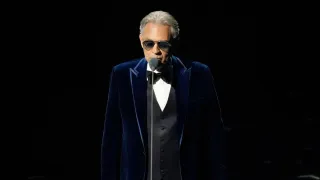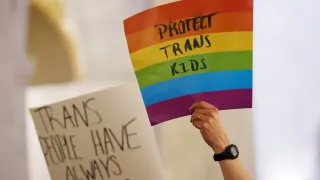June 12, 2021
Eytan Fox Talks Sex, Love, and Friendship in 'Sublet'
Kilian Melloy READ TIME: 11 MIN.
Out Israeli director Eytan Fox returns to the genre of the emotionally charged relationship drama with "Sublet," a charming and deeply felt story about Michael (out stage and film star John Benjamin Hickey), an American travel writer, renting an apartment for a few days from Tomer (Niv Nissim, making his film debut), an Israeli film student. When Tomer ends up not having anywhere to live during Michael's stay, the two share the apartment. With Tomer as his guide, Michael sees more of the "authentic" Tel Aviv, but he also starts to revisit parts of himself he hasn't accessed since his youth – if ever.
Whereas Michael is married and settled and in the midst of negotiating with his husband about having a child via surrogacy, Tomer is living a life of artistic and sexual abandon. Indeed, Tomer is a thoroughly 21st Century gay man, to the point of having been conceived by a single mother who preferred to rely on a sperm bank rather than a traditional husband. If Michael finds a guide, and a refreshing dose of youth, in Tomer, then Tomer finds a father figure in turn in Michael.
The two men rub up against their generational differences, but they also discover they have many things in common, including a growing affection. Whether that mutual attraction is sexual, spiritual, creative, or some combination is something they slowly, gingerly begin to figure out as Michael's stay in Tel Aviv becomes an emotional adventure for both of them.
Eytan Fox chatted with EDGE about the film, casting the two leads based on their palpable chemistry and his enduring love affair with Tel Aviv, the setting for most of his movies.
EDGE: How are you today?
Eytan Fox: I'm good, I'm good, I'm good! And I'm very happy because "Sublet" just opened in theaters in Tel Aviv – in Israel, for that matter. And as we all know, we haven't had theaters in a long while, and theaters are back, and our film is shown in them, which is wonderful. So, I'm feeling good today.
EDGE: You seem to have a real love for Tel Aviv. Your films are mostly set there.
Eytan Fox: I think it's one of the greatest cities in the world. That's a good reason to have a love story with a city. I don't think I'd choose to live anywhere else. Maybe Italy; maybe Rome, maybe Florence.
EDGE: "Sublet" has a lot of fun in letting Tomer, the young local, show Michael, the seasoned travel writer, around different neighborhoods – taking him to out-of-the-way places for foods he wouldn't find, for example.
Eytan Fox: [Tel Aviv] has wonderful restaurants, wonderful beaches, very warm people, beautiful men and women. The people are more progressive, we care about our neighbors – our Palestinian neighbors, our Arab neighbors. What I'm trying to say is, in many ways, there's Israel, and then there's Tel Aviv. We should start a state of Tel Aviv in Israel.
EDGE: And it's a very LGBTQ-accepting city.
Eytan Fox: So many young people have escaped from different parts of Israel and moved to Tel Aviv. My move from Jerusalem to Tel Aviv, in the late '80s was a big thing for me. I grew up in Jerusalem, and it has wonderful things about it. But it's become more and more religious. More and more conservative, [and] poor. Moving to a wonderful city of Tel Aviv, which is so accepting of gays, was a big thing for me.
EDGE: After 2013's "Cupcakes," which is a lighthearted musical, I wasn't sure what to expect from "Sublet." It's funny and touching, but it's more a relationship drama than a frolic. Was it like a homecoming, as a storyteller, for you to return to this genre?
Eytan Fox: Yeah, but people outside of Israel don't know my television work. Some people in Israel think I'm an Israeli Ryan Murphy. I have a lot of TV shows in Israel that are more like "Cupcakes." But you're right; "Yossi," which might be my favorite film, and "Cupcakes" were mixed by the same mixer in Paris, and he said, "I can't believe this is the same guy who made 'Yossi,' and now 'Cupcakes.' What is this? Multiple personalities?"
"Sublet" might be my most personal film, and it's very much about me now, about who I am today. There were some films that I made, and I thought, "Okay, I'm making something about young people, but I'm not that anymore. I'm not 25 anymore, and I'm trying to be that. I'm making a film about something that supposedly interests me, but maybe not really." And this time, there was a complete synchronicity between who I was when I started working on "Sublet," and what the film was: Its themes, its cinematic style, which is very low-key. Not a lot of excitement going on cinematically, and I like that; I want it to be quiet and simple. No shticks, as we say in Yiddish.
EDGE: Is the film a dialogue you're having with yourself at your age now versus your age in the past? Or is a dialogue between yourself as a member of our generation and then thinking, "How do I talk to people who are coming up behind me, who don't have the same experiences or the same perspective?"
Eytan Fox: It's a mixture between all those things. I turned 50 when I started working on the script, and I said, "Okay, so what does this mean, and who am I now as a Jew, as an Israeli, as a gay man, as a married gay man, as a childless gay man, as a filmmaker? Am I the guy who made 'Cupcakes,' this Eurovision romantic comedy, feel-good, kitschy, campy film?" And, of course, you don't have to be only one thing. But it was interesting: How did I come to be this guy? Why don't I have children? The difference between the world of gay men our age, and young gay men in Tel Aviv, and in the world, [for whom] so much of it is supposed to be a non-issue. For us to come out was such a big issue; to tell our parents, to tell our friends if you were gay, to create for ourselves a gay world.
When I was a kid in Jerusalem, gay men were not supposed to have relationships. They were only into cruising parks and one-night stands. People thought you could not maintain a long-term relationship, there was something screwed up about you. You'd never have a family, of course; you wouldn't have children. When I was a young man in Jerusalem, telling me that [marriage and family] would one day be an option, and we'd be talking in a free way about these issues, I'd say you're crazy. "What are you talking about? People are going to throw us into jails, and, I don't know, throw us out of our families or cities or whatever." That was really what we felt when I was a young man in Jerusalem in the early 1980s, and things have changed dramatically.
And as the [younger] character in "Sublet" says, he doesn't give a damn. "I don't care about what you old guys did! I live my life. I don't want those definitions – gay, straight. I want to enjoy everything that life can offer: Men, women, one sexual partner, 100 partners, whatever!" It's this struggle between two different men of different ages, different generations, different approaches to life. I was trying to be as accepting as possible of these young men that I was trying to portray and understand. I found myself being very judgmental at times, but I said to myself, "Don't, don't, don't! You have to love these people, you have to understand them, you have to get into their heads." And John Benjamin, who is my age, is a gay man from New York, so it was me and him versus the young people we were working with.
EDGE: Did you start with John Benjamin Hickey and build the cast around him?
Eytan Fox: Yeah. When I started working on "Sublet," I thought, "Okay, so who do I want to cast?" I had different people in mind, or who were suggested to me, and I remembered John from seeing him, I think the first time I saw him was Off-Broadway in "Love! Valour! Compassion!," in 1994 if I'm not mistaken. I've been following his career ever since. I saw him in "The Normal Heart," and on television and in films, and I thought he was the exact right [actor for this] character.
I wanted an openly gay actor for the role. I usually had to cast straight actors for gay roles because there were very few openly gay actors in Israel, and the ones who were about to come out, their agents would say, "Don't take gay roles! That won't be very good for your career." And now it's gay actors saying, "Why don't you take us? You have to take us! A gay role should be performed by a gay actor." The world has changed in many, many ways.
So, I had John. I sent him the script. He loved it. He told me that he loves my films and knows them, which was a wonderful thing to hear. We met in London; he was working on this wonderful play called "The Inheritance." We met in London, we met in New York, we decided we're going to make this film. It took some time to raise the money.
And then I was looking for a wonderful partner for him in Israel. I met a lot of young actors in Israel. Then John came over for two days to have this, I think it's called a chemistry test in America, where you have him and four different young actors. It was clear that Niv was the guy for him. They really hit it off in amazing ways. Niv's family adopted John. He came over for Friday night dinners, Shabbat dinners; they took him on field trips all over the country. It was really an amazing relationship that I saw developing, which was so much like the relationship in the film. It was nice to see it happening.
EDGE: It does feel like there's more to that emotional bond between the actors – it feels like something that extends off-screen.
Eytan Fox: Yeah, it was definitely there between John and Niv. When the actors do not have this chemistry, it's very different; it's difficult to create chemistry on screen. This film is all about these two men, and if they don't have this chemistry, there's no film.
EDGE: I don't think it's a spoiler to acknowledge that Michael and Tomer have a physical relationship; it's on the poster. But given the mentorship connection they share, did you have any reservation about letting the story go in that direction?
Eytan Fox: Okay, so that that goes me back to a meeting, a beautiful dinner I had in Rome. We're talking with my friend, a wonderful Italian television writer and director. I sent him the script, and I said, "Listen, I don't know what to do. Should they have this sexual scene between them? How will people understand that? Will it take over the film?" He said, "If you don't have that sex scene, I'm never going to talk to you again!"
[Laughter]
Eytan Fox: He said, "I want you to say to the world that we older gay men can still be sexy and desirable for younger people." That was him making jokes. But he said, "That is part of a relationship, you know, sexual attraction, physical attraction that is not necessarily part of a relationship but could be. And it obviously is here, or you want it to be, so go ahead with it. Don't be afraid."
We were supposed to have our international premiere at the Tribeca Film Festival as part of its 2020 [lineup], and the [artistic director] of Tribeca Film Festival is Frederic Boyer, who used to be one of the people who ran Cannes Film Festival. He told me one of the things he loved about the film – and he's a straight man – was their sexual lovemaking scene doesn't change everything, it doesn't turn everything upside down. It's part of the relationship, and the next morning they wake up, and they're not only people who had sex last night, they're still good friends. They're still, to some extent, father and son, son and father – though it's not very clear who the father is in this situation. But that was a wonderful thing to hear.
Yes, there was tension about making that decision, but I'm very happy with that scene and the way they do meet and make love. I'm very happy with that.
"Sublet" opened June 11.






